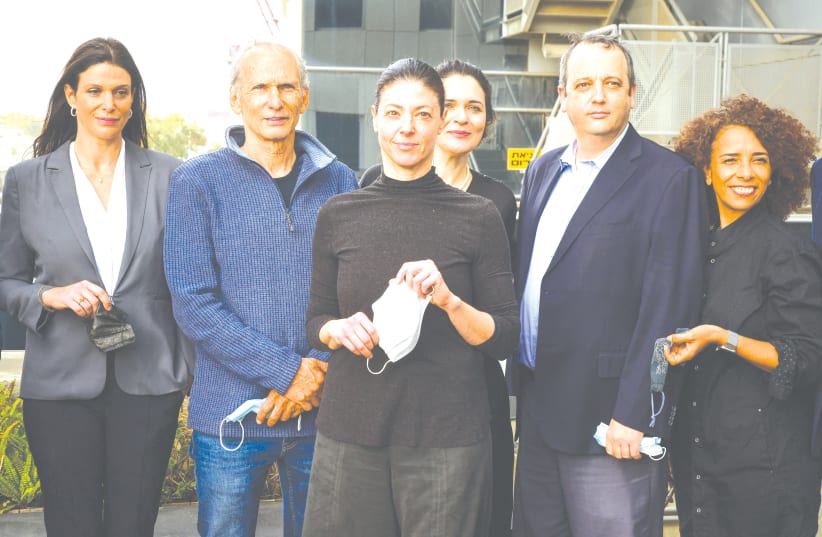In the past, the Labor Party symbolized political pragmatism while maintaining the State of Israel as a Jewish and democratic state. For all the leaders who headed Labor in the past – figures such as David Ben-Gurion, Levi Eshkol, Golda Meir, Yitzhak Rabin, Shimon Peres and Ehud Barak – security was a cornerstone for the existence of the State of Israel.
Since its establishment, the Labor Party had represented the mainstream of Israeli society, which strives for peace with security and for maintaining the important balance between Judaism and democracy. Yet today, after the extreme Left has taken over Labor, it is nothing more than a marginal far-left party on the political spectrum somewhere between Meretz and the Joint Arab list.
After Amir Peretz brought the party to the brink of the political cemetery, many Labor voters hoped for a serious figure to come forward, a leader who represents the Labor movement and its values. But all the figures who matched the DNA of Labor as a leading center-left party – from former prime minister and party chairman Ehud Barak to former intelligence chief Gen. Amos Yadlin – refused to take the reins. This situation left Labor, the leadership of which key figures in the past competed, with only one candidate, and she received the Labor Party on a silver platter.
Michaeli, who undoubtedly waged an important and just fight against Peretz, won a huge majority in the party primaries. Yet, although she won 77.5% of the vote, it was a Pyrrhic victory for Labor. In practice, not only did no serious candidate with political and public stature run against Michaeli, but most party members chose to vote with their feet. While in the previous elections for the party chairman, the turnout was around 65%, only 26% of party members voted in the primaries in which Michaeli was elected. That was a tremendous expression of distrust by Labor members, who apparently already understood that their party had no chance of resurrection.
THE DISGRACE was repeated in the party’s list primaries, when only 40% of the party’s members, a total of 18,000 people, of whom 8,000 were new members, came to fulfill their democratic right. Yet looking at the Labor list for the 24th Knesset, one sees that something is rotten, and that the Labor Party has completely changed its face. We did not see any well-known public figure with electoral power running for Labor’s list, with the exception of former Knesset members Omer Bar-Lev and Nachman Shai.
In practice, almost all the candidates in the primaries were party activists and figures who previously ran for the Knesset and were not elected. With the exception of a few media people and a former children’s channel presenter, not even one prominent figure in Israel wanted to be on the Labor list.
But worst of all, and here the elders of Mapai are sure to roll over in their graves, and those of them who are still alive are certainly taking a pill against nausea: The primary results illustrate that the extreme Left has taken over the Labor Party. How can one explain that while Shai, a former IDF spokesman who won 6,684 votes to come in sixth in the primaries, received only 415 votes more than an anonymous candidate who expressed support for an Islamic Jihad terrorist organization operative?
For those Labor Party members who forgot, Islamic Jihad is the same terrorist organization that carried out the attack at the Beit Lid junction in January 1995 in which 21 Israelis were killed. The same candidate, who is currently located seventh on the Labor list, even shared a post of a picture of Prime Minister Benjamin Netanyahu with a hanging rope.
The Labor Party led by Merav Michaeli has nothing to do with the historic Labor Party. Today it is a marginal far-left party that is far from representing the mainstream of Israeli citizens, as it fights against Meretz for the same small left-wing electorate. It seems that despite the euphoria and atmosphere of renewal that party chairwoman Merav Michaeli is trying to convey, Labor is about to crash in the upcoming elections below the 3.25% electoral threshold.
The writer is a PhD candidate and research assistant at the International Center for Policing and Security at the University of South Wales, UK, and an adjunct researcher at the National Security Studies Center at the University of Haifa. He was a foreign affairs and political adviser to former Labor Party chairman Isaac Herzog, former deputy chairman of the Labor Party Youth, and a former candidate on the Labor Knesset list.
